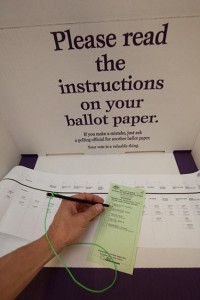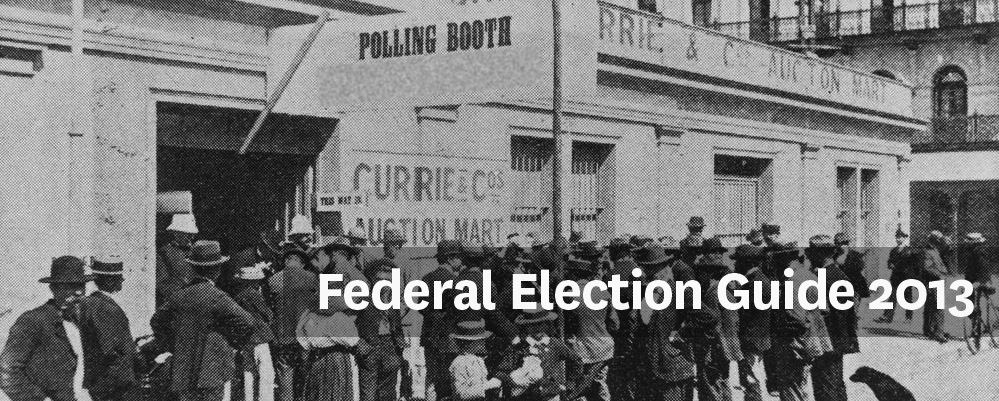Vote Fred, risk getting Pauline: Dilemmas for Christian voters

Source: aec.gov.au
In the last week of the election the questions around how to put your voting preference into practical effect looms for many Christian voters, especially those of a conservative frame of mind.
There are a record number of “Christian” parties seeking your vote under the Australian Christians, Christian Democrats (in NSW), Family First, Democratic Labour Party and Rise Up Australia Party. At the last Federal Election “Christian” parties generally got at least .4 of a Senate quota between them. (In a state, in a half senate election where six senators are elected, a quota is one seventh of the vote or 14.3 per cent of the vote. In a territory where two senators are elected at each election, the quota is 33.3 per cent of the vote.)
This means that if the “Christian” parties exchanged preferences, they would have a good chance of electing a senator. (I have used inverted commas on “Christian” because some of these parties seek a broader constituency although they have a largely Christian base.)
Sadly the “Christian” parties have not preferenced as tightly as they might.
In NSW for example, Christian Democrat (the Fred Nile Group) preferences flow to the Uniting Australia party, the Shooters and Fishers Party, Katter’s Australia Party, One Nation and Rise Up Australia.
In South Australia, Family First preferences flow to the No Carbon Tax Climate Sceptics, Australian Motoring Enthusiasts Party and then the Australian Christians. In fact in SA, all the “Christian” parties have preferenced the No Carbon Tax Climate Sceptics second.
There appears to be a consensus among the small conservative parties to preference the Coalition and Labor tickets well down, which increases the chances of a minor party candidate winning a seat.
But many Christians will not want their votes to flow to (say) Pauline Hanson in NSW, or for the No Carbon Tax Sceptics in SA ahead of another “Christian” party.
An analysis in the Fairfax papers on Sunday predicts the results of the small party preference deals.
- One Nation leader Pauline Hanson has a serious chance of defeating the Liberals’ intended finance minister, Senator Arthur Sinodinos, for one of the two final seats in NSW.
- Family First, which won a Senate seat in Victoria in 2004 with 1.9 per cent of the vote, could do it again, with their lead candidate Ashley Fenn rated a 50/50 chance of unseating Liberal senator Helen Kroger.
- The Coalition is odds on to lose a further seat in Queensland, probably to country singer James Blundell of Way Out West fame, running for Bob Katter’s Australia Party, but possibly to the Australian Fishing and Lifestyle Party, One Nation or the Australian Christians.
- In South Australia, the No Carbon Tax Climate Sceptics are given a strong chance of unseating prominent Green Sarah Hanson-Young, even if they get as little as 0.15 per cent of the vote.
Politics is a contact sport, and the reason the deals are done is simply to get more votes. The object is to find a party who will poll slightly less than you so, as the votes are added up, they will be eliminated before your party and their preferences added to your vote. Obviously the other party will believe that you will poll slightly less than them and they will end up with your votes.
It’s an electoral version of Russian roulette. One impeccably conservative Christian commentator, Ros Phillips of Family Voice Australia is concerned about preferences.
“Sadly, some preference deals made between the minor parties means that people who vote ‘1’ in a box above the line may end up helping to elect someone they wouldn’t support in a blue fit,” Ros Phillips said. “I’ve told callers the only way they can be absolutely sure their vote ends up with a party that shares some of their values is to number every square below the line.
“This means numbering:
‧ 110 boxes in NSW
‧ 82 boxes in Queensland
‧ 97 boxes in Victoria
‧ 73 boxes in SA
‧ 62 boxes in WA
‧ 54 boxes in Tasmania
‧ 27 boxes in ACT
‧ 24 boxes in NT
“Election expert Antony Green has pointed out that according to law, voters are allowed to miss out ten percent of the boxes below the line, and mess up the numbering three times, yet still have their vote accepted as formal. This is good news for the preference plodders,” Ros Phillips said.
To take our NSW example: The Christian Democrats are relying on One Nation to receive less votes than them, and so if you vote for Pauline (Hanson) you will end up with Fred (Nile). (To make this work, the Katter party, preferenced second by One Nation, would have had to be eliminated first).
The One Nation people would like to think that they get the preference vote from the Christian Democrats. Last election, the Christian Democrats got more than twice the votes of One Nation so it’s more likely the Christian Democrats will win from this deal. It looks bad but it will likely deliver votes. However, going on last election figures, exchanging preferences with Family First would achieve about the same number of votes and look a lot better.
Taking the SA example, the No Carbon Tax Climate Sceptics have snared the preferences of all the “Christian” parties. This means they have played the game very carefully, one Christian party insider told Eternity. Perhaps these votes will flow back to the Christian parties via a couple of independents and One Nation – unless the Christian parties finishing lowest don’t give the sceptics a big boost.
But the truth is the flows are unpredictable.
“Voters can end up electing people they never would have dreamed of voting for themselves,” Charlie Goodman writes in the APN newspapers (Queensland and NSW),” said the party insider.
“Such was the fate of left-wing voters in Victoria in 2004, when the lead candidate for … Family First, Steve Fielding, was elected to the Senate ahead of Greens candidate David Risstrom.
“Fielding had won less than 2 per cent of first preferences—less than one seventh of the votes he needed—but ended up riding the preferences of 11 different parties into office.
“You might think of Fielding as the Steven Bradbury of Australian politics.
“That’s how the system is supposed to work.
“With Australia’s compulsory preferential voting, no vote is wasted.
“Less popular candidates were excluded one by one until Fielding and Risstrom were all that remained in contention for the final Senate seat, and Fielding had more support than Risstrom did.
“Fielding was undeniably lucky, but his win was legitimate and the system didn’t fail.
“Having said that, it’s very likely that if every voter had been required to fill out their own preferences, Risstrom would have won and Fielding would never have been a Senator.
“Because whilst he was quite a socially conservative candidate himself, Fielding was elected with the help of quite a lot of progressive voters.
“Among those 11 parties that had preferenced Fielding over the Greens were the left-leaning Australian Democrats and Labor Party, and it was Labor’s preferences that ultimately got Fielding over the line.”
Ninety six per cent of voters will vote “above the line” when faced with the complicated senate voting paper. Readers who want to make sure their preferences reflect their views, and not some deal the parties have cooked up, should check preferences. We’d recommend the ABC guide, or there’s a more visual indicator at The Global Mail.
It is an obvious question to ask, if the “Christian” parties were to tightly preference each other, would they have a very good chance of winning seats? In NSW, Family First would be a very similar preference exchange party (in terms of votes) to One Nation for the Christian Democrats. In SA, preferencing each other would mean the Christian parties might get one of each other up instead of contributing to the canny No Carbon Tax Climate Sceptics.
Another party insider told Eternity that Victoria is where the problem starts with the DLP, Family First and the Australian Christians all in with a chance but somehow unable to agree on how they could preference each other.
Eternity understands that there were discussions between the Family First and Christian Democrat parties over preferences. Deal or no deal, it’s hard to see why a Family First voter would not put the Australian Christians/Christian Democrats second and vice versa. It might be even better if some of these parties would merge.
A second dilemma for conservative Christian voters is what weight to put on Coalition policy regarding same sex marriage.
On the Australian Christian Lobby’s australiavotes.org.au, the Coalition response to the issue of same sex marriage is: “The Coalition policy supports the current definition of marriage contained in the Marriage Act.
“Any change to the policy would be a matter for the Party Room in the future, as is the case with all policies.
“Tony Abbott supports the existing definition of marriage.”
Eternity has checked with the Australian Christian Lobby that the words are as given by the Coalition, rather than an ACL summary.
The Coalition statement is written to appeal to the ACL audience, quite naturally. And in summarising the party responses the ACL’s Lyle Shelton believes policies from both sides of politics would be both attractive and disappointing for Christians and that meant it was important for people to examine the Australiavotes.org.au website carefully before September 7.
He said the Coalition’s answers in the questionnaire on marriage, treatment of charities, national curriculum and freedom of religion would “appeal to many Christian voters but so too would Labor’s on gambling, homelessness, internet safety and overseas aid.”
In The Australian newspaper, the two major parties’ positions on same sex marriage is summarised with subtle differences in a table accompanying a Peter van Onselen piece.
The ALP position: “Support gay marriage vote during the next parliament”. The Coalition policy is “Possible conscience vote on gay marriage if the party room supports such a shift”.
The Coalition summary on the ACL site give the impression that the Coalition policy is not to change the Marriage Act. That’s true, until the new Parliament is seated, and until the party room decides whether or not to change their position.
Click below to view our Election guide:
Email This Story
Why not send this to a friend?



